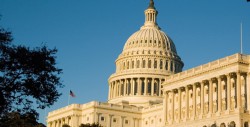
Congress has reaffirmed the partnership between the federal government and American research universities by enacting a bipartisan appropriations spending package for fiscal year 2017 that preserves and increases funding for key federal research agencies—including a $2 billion increase for the National Institutes of Health.
The U.S. Senate voted to approve the nearly $1.1 trillion omnibus spending bill on May 4, with President Donald Trump signing the bill the following day.
This marked the second consecutive $2 billion increase for the NIH, reflecting the strong bipartisan support for biomedical research in an otherwise austere funding environment.
Senior appropriator Sen. Lamar Alexander, R-Tenn., played an instrumental role in finalizing the $1.07 trillion appropriations package as chair of the subcommittee that funds Department of Energy research and as senior member of the subcommittee that funds the NIH and the Department of Education. Alexander praised the bill for its “major boost for programs like the Cancer Moonshot to speed cancer research; the Precision Medicine Initiative to develop treatments and cures tailored to a patient’s genome; and the BRAIN Initiative to help prevent diseases like Alzheimer’s.”
“This legislation helps deliver on the promise of the 21st Century Cures Act … by delivering a boost of funding for the National Institutes of Health—or as Dr. Francis Collins calls it, the National Institutes of Hope,” Alexander said.
House appropriator Rep. Chuck Fleischmann, R-Tenn., and Democratic Reps. Jim Cooper and Steve Cohen also supported the spending package, which will fund the government for the remaining five months of the current fiscal year.
Vanderbilt is proud to partner with the federal government in conducting world-class research that helps drive our economy forward and keeps our country safe.
“We are grateful to the members of our delegation who supported this important funding bill,” Chancellor Nicholas S. Zeppos said. “This legislation makes key investments in scientific and engineering research that are critical to our ability as a country to innovate. Vanderbilt is proud to partner with the federal government in conducting world-class research that helps drive our economy forward and keeps our country safe.”
Other key research agencies saw either slight increases or flat funding—also a victory in an otherwise austere budget environment. Agencies seeing slight increases compared to fiscal year 2016 include the Department of Energy’s Office of Science and Advanced Research Projects Agency-Energy, the National Science Foundation, and the National Endowment for the Humanities.
Vanderbilt’s Washington, D.C.-based Office of Federal Relations advocates on behalf of the university’s federal funding priorities and communicates frequently with key policy makers on the importance of federal investments in science and engineering research and education. The office works closely with individuals on campus to help further Vanderbilt’s federal policy priorities.
“We are fortunate to have so many members of our congressional delegation who agree with us that science should not be a partisan issue,” Assistant Vice Chancellor for Federal Relations Christina West said. “We are grateful for their strong support for Vanderbilt’s federal priorities, including investments in research and education. Not only do such investments provide critical support for our researchers on campus, but they also help train the next generation of scientists, engineers and innovators.”